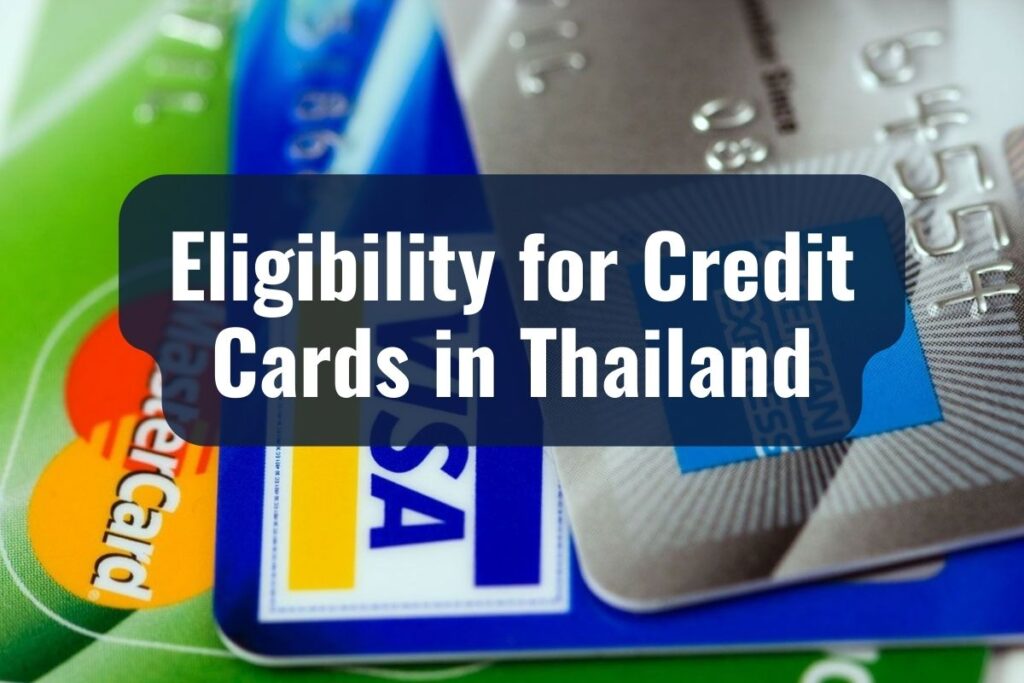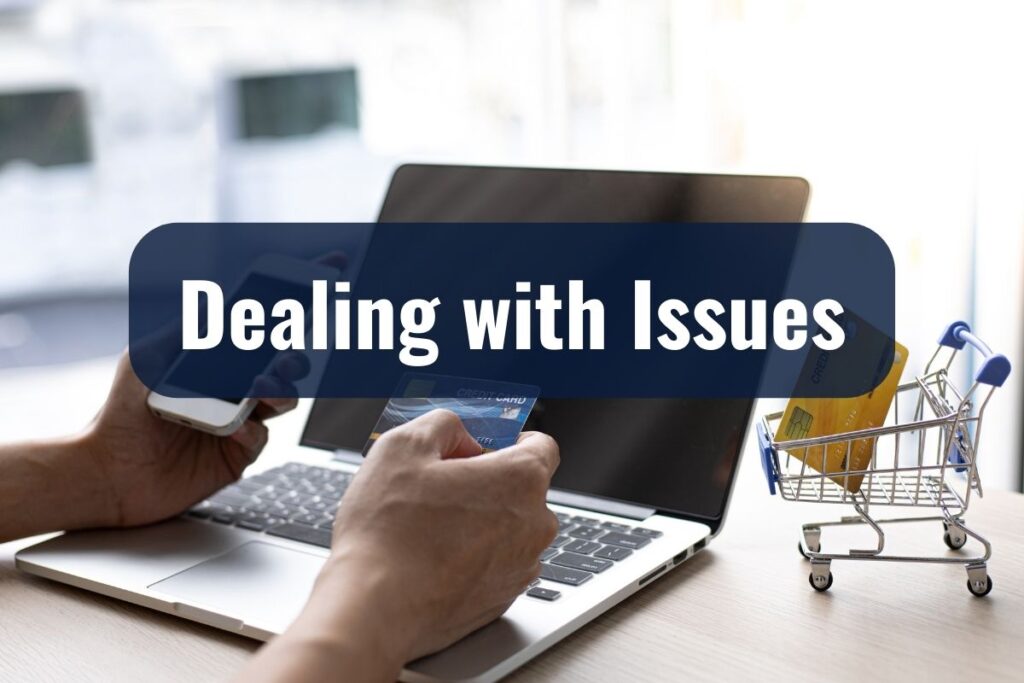Thailand attracts many foreigners who come to live, work, or retire. Amidst the excitement of settling in a new country, understanding the local financial landscape becomes crucial. This guide is designed to demystify the world of credit cards in Thailand, specifically tailored for expatriates and foreigners who may not be fluent in Thai.
From understanding the eligibility criteria to choosing the right card, and managing your finances effectively, we cover it all. Our goal is to ensure that you feel confident and informed when dealing with credit cards in this beautiful country.
KEY TAKEAWAYS
- Thai credit card eligibility hinges on residency status, stable income, and a clear financial history.
- Choose a credit card in Thailand that aligns with your lifestyle and financial goals.
- Apply for credit cards with complete and accurate documentation for a smoother process.
- Use credit cards wisely by monitoring spending and understanding billing cycles.
- Be aware of fees like annual charges and interest rates to manage credit costs effectively.
- Maximize benefits by aligning card usage with reward structures and spending habits.
- Balance credit card use with other payment methods for optimal financial convenience.
Understanding the Thai Financial System
Thailand’s financial landscape is a dynamic and integral part of its fast-growing economy. As a foreigner residing in the Land of Smiles, grasping the basics of this system is crucial for managing your finances effectively, particularly when it comes to credit cards.
The Banking Sector in Thailand
At the heart of Thailand’s financial system lies its banking sector. The country boasts a mix of local and international banks, each offering a range of financial services. Local banks, such as Bangkok Bank and Kasikornbank, have a widespread presence across the country. They are well-acquainted with the local market and often the preferred choice for everyday banking needs.
International banks, like HSBC and Citibank, also operate in Thailand. These banks might be familiar to expatriates and can offer services that align more closely with international banking standards. They are particularly adept at providing services for foreign transactions and global financial needs.
Regulation and Stability
The Bank of Thailand (BOT), the country’s central bank, regulates the financial institutions. It ensures the stability and integrity of the Thai financial system. The BOT’s policies and oversight play a crucial role in maintaining confidence in the banking sector, a critical aspect for foreigners investing or managing their finances in Thailand.
Digital Banking and Fintech
Thailand is also witnessing a digital revolution in its banking sector. Fintech innovations and online banking services are becoming increasingly prevalent, offering convenient and efficient ways to manage finances. This digital shift is particularly beneficial for foreigners who prefer online transactions and those living in areas where bank branches might not be readily accessible.
Eligibility for Credit Cards in Thailand

When it comes to obtaining a credit card in Thailand, the eligibility criteria set by Thai financial institutions can be different from what many foreigners might be accustomed to in their home countries. Understanding these requirements is the first step in successfully applying for a credit card.
Criteria for Foreign Applicants
Thai banks often have specific eligibility criteria for foreigners applying for credit cards. These typically include:
- Residency Status: Most banks require applicants to have a valid work permit or a long-term visa. This is to ensure that the applicant has a stable presence in Thailand.
- Employment and Income: Proof of employment and a steady income are crucial. Banks usually have a minimum income requirement, which varies depending on the bank and the type of credit card.
- Age: Applicants must typically be between 20 and 65 years old, although this can vary slightly between banks.
- Credit History: While your credit history from your home country might not be directly accessible to Thai banks, they may require documentation or evidence of your financial responsibility.
Required Documents
The documentation required to apply for a credit card as a foreigner in Thailand generally includes:
- Passport and Visa/Work Permit: To verify your identity and residency status.
- Proof of Employment: This could be an employment contract or a letter from your employer.
- Income Verification: Recent pay slips or a bank statement showing your salary.
- Address Proof: Documentation confirming your residential address in Thailand.
Application Considerations
It’s important to approach the application process with the right expectations. The approval time and success may vary based on your specific circumstances and the bank’s policies. Being prepared with all the necessary documentation and a clear understanding of the requirements will streamline the process.
Choosing the Right Credit Card
Selecting the most suitable credit card in Thailand requires careful consideration of various factors. The right card not only provides financial flexibility but can also offer valuable rewards and benefits. Here are some key aspects to consider:
Types of Credit Cards Available
Thai banks offer a range of credit cards, each designed to suit different financial needs and lifestyles. Common types include:
- Standard Cards: Ideal for everyday use, offering basic credit facilities without many additional perks.
- Rewards Cards: These cards accumulate points for purchases, which can be redeemed for various rewards.
- Cashback Cards: Perfect for those who prefer cash rewards, these cards offer a percentage of spending back in cash.
- Travel Cards: Best for frequent travelers, offering travel-related rewards like air miles and hotel discounts.
Factors to Consider
When choosing a credit card, consider the following factors to ensure it aligns with your financial habits and goals:
- Interest Rates: Credit card interest rates in Thailand can vary widely. It’s essential to understand the rates and how they are applied.
- Annual Fees: Some cards have annual fees, while others do not. Weigh the benefits of the card against its cost.
- Credit Limit: The credit limit should align with your spending habits and financial capability.
- Rewards and Benefits: Evaluate the rewards and benefits offered by the card. Ensure they are relevant and valuable to your lifestyle.
- Acceptance and Convenience: Consider how widely the card is accepted in Thailand and abroad, especially if you travel frequently.
Financial Advice
While rewards and benefits are attractive, it’s important to choose a card that fits your financial situation. A card with high rewards but a high annual fee might not be the best choice if you’re a moderate spender. Similarly, a travel card is only beneficial if you travel frequently.
Applying for a Credit Card

Embarking on the journey of applying for a credit card in Thailand can be a straightforward process, provided you are well-prepared and understand the steps involved. This section aims to guide you through the application process, ensuring a smooth and successful experience.
Step-by-Step Application Process
- Research and Selection: Begin by researching various credit cards offered by Thai banks. Compare their features, benefits, and eligibility criteria to select the one that best suits your needs.
- Gathering Required Documents: Prepare all the necessary documents as previously outlined, including your passport, visa or work permit, proof of employment, income verification, and address proof.
- Application Submission: Applications can usually be submitted online, in-person at a bank branch, or sometimes even at shopping malls where banks have promotional booths. Choose the method that is most convenient for you.
- Application Review and Approval: Once submitted, the bank will review your application. This process can take a few days to a few weeks. During this period, the bank might contact you for additional information or clarification.
- Receiving Your Credit Card: Upon approval, the bank will notify you, and your credit card will be issued. It can either be mailed to your address or collected at a branch.
Tips for a Successful Application
- Ensure Accuracy: Make sure all the information provided in your application is accurate and up-to-date. Any discrepancies can lead to delays or rejection.
- Understand the Terms: Familiarize yourself with the terms and conditions of the credit card, including interest rates, fees, and credit limit.
- Be Patient: The approval process may take time, so patience is key. Constant follow-ups are not necessary unless the bank specifically requests additional information.
Managing Expectations
It’s important to manage your expectations during the application process. Approval is not guaranteed and is subject to the bank’s policies and your financial standing in Thailand. If your application is not successful, seek feedback from the bank to understand the reasons and explore other options or cards that might be more suitable for your profile.
Related: How to Get a Credit Card in Thailand as an Expat (2024)
Using Your Credit Card Wisely
Once you have successfully obtained a credit card in Thailand, the next crucial step is to use it wisely and responsibly. Smart management of your credit card not only ensures financial stability but can also enhance your creditworthiness. Here are some essential tips to help you use your credit card in the most beneficial way.
Managing Credit Card Spending
- Stay Within Budget: It’s easy to overspend with a credit card. Always keep track of your purchases and ensure they align with your budget.
- Understand Your Billing Cycle: Familiarize yourself with the billing cycle of your credit card. Knowing when your bill is due each month helps in planning your payments and avoiding late fees.
Avoiding Common Pitfalls
- Late Payments: Always pay your credit card bill on time. Late payments can lead to additional charges and negatively impact your credit score.
- Minimum Payments: While paying the minimum amount is an option, it can lead to higher interest charges in the long run. Aim to pay off the full balance when possible.
- Currency Conversion Fees: Be aware of fees associated with foreign currency transactions if you use your card abroad or for online purchases in other currencies.
Monitoring Credit Card Activity
- Regular Statement Checks: Regularly review your credit card statements to monitor your spending and spot any unauthorized transactions.
- Online Banking: Utilize online banking services to keep a real-time check on your credit card usage.
Building a Good Credit History
- Consistent Payments: Consistently paying your credit card bills on time helps build a good credit history, which can be beneficial for future financial dealings in Thailand.
- Credit Utilization Ratio: Try to keep your credit utilization ratio low (generally below 30% of your limit), as high utilization can indicate overdependence on credit and negatively affect your credit score.
Financial Awareness and Responsibility
- Emergency Use: It’s advisable to use credit cards for emergencies rather than regular spending. This ensures you don’t accumulate debt unnecessarily.
- Understanding Interest Rates: Be fully aware of the interest rates on your card, especially if you plan to carry a balance from month to month.
Understanding Fees and Charges

Navigating the realm of credit cards in Thailand involves a clear understanding of various fees and charges that can apply. Being aware of these costs is essential for financial planning and avoiding surprises in your monthly statements. Let’s break down the common fees and charges associated with credit cards in Thailand and explore ways to minimize them.
Common Credit Card Fees
- Annual Fees: Many credit cards charge an annual fee, which can vary based on the type of card and the benefits it offers. Some premium cards with extensive rewards have higher fees.
- Interest Charges: If you don’t pay off your full balance by the due date, interest will be charged on the remaining amount. Understanding the interest rate of your card is crucial.
- Late Payment Fees: Missing a payment due date can incur late payment fees. Ensuring timely payments is key to avoiding these charges.
- Over-the-Limit Fees: Exceeding your credit limit can lead to over-the-limit fees. Regularly monitor your spending to stay within your allocated limit.
- Cash Advance Fees: Withdrawing cash using your credit card comes with cash advance fees, and interest typically starts accruing immediately.
Minimizing Fees and Interest
- Choose the Right Card: Select a credit card that aligns with your spending habits and financial situation. If you are unlikely to benefit from a card with high annual fees, consider one with lower or no fees.
- Understand the Terms: Familiarize yourself with all the terms and conditions of your credit card, especially the fees and interest rates.
- Pay On Time and In Full: Paying your bill on time and in full each month is the best way to avoid interest charges and late payment fees.
- Monitor Your Credit Limit: Keep track of your spending to ensure you do not exceed your credit limit.
- Limit Cash Advances: Use cash advances only in emergencies, as they can be costly due to immediate interest and fees.
Awareness and Planning
- Read Your Statements: Regularly review your credit card statements to understand the fees and charges applied.
- Ask Questions: If you’re unsure about any fee on your statement, contact your bank for clarification.
Rewards and Benefits
Credit cards in Thailand often come with a range of rewards and benefits that can enhance your spending experience. Knowing how to leverage these perks can lead to significant savings and exclusive advantages. Here’s an overview of typical rewards and tips on how to make the most of them.
Types of Rewards and Benefits
Cashback: Some cards offer a percentage of your spending back as cashback. This is a straightforward benefit, especially beneficial for those who use their cards for regular purchases.
Points Programs: Many credit cards have points programs where you earn points for every purchase. These points can be redeemed for various rewards, including merchandise, travel bookings, or vouchers.
Travel Benefits: Travel-oriented cards might offer air miles, airport lounge access, or discounts on hotels and car rentals. These are ideal for frequent travelers.
Discounts and Special Offers: Credit cards often have tie-ups with restaurants, retail outlets, and online platforms, providing cardholders with exclusive discounts and special offers.
Maximizing Credit Card Rewards
- Understand the Rewards Structure: Familiarize yourself with how rewards are earned and redeemed on your card. Each card has its own system, and knowing it well can help you maximize benefits.
- Align Spending with Rewards: Choose a card whose rewards align with your spending habits. For example, if you travel frequently, a card offering travel rewards would be most beneficial.
- Regular Review of Offers: Keep an eye on any special promotions or changes in the rewards program. Banks often run limited-time offers that can be highly rewarding.
- Use as Primary Payment Method: To maximize rewards, use your credit card as your primary payment method for everyday expenses and bills, ensuring you stay within your budget.
Responsible Use of Rewards Cards
- Avoid Overspending: While it’s tempting to spend more to earn more rewards, it’s important to avoid unnecessary purchases. Always stick to your budget.
- Pay Balances in Full: To truly benefit from rewards cards, avoid carrying a balance. The interest charges can outweigh the value of the rewards earned.
- Redeem Rewards Wisely: Regularly check your rewards balance and redeem them before they expire. Choose redemption options that offer the best value for your points or miles.
Dealing with Issues

While credit cards offer convenience and benefits, there may be times when you encounter issues such as lost or stolen cards, fraudulent transactions, or disputes with charges. Knowing how to handle these situations promptly and effectively is essential for safeguarding your finances and peace of mind.
Lost or Stolen Credit Cards
- Immediate Reporting: If your credit card is lost or stolen, report it to the bank immediately. The quicker you report, the sooner the card can be blocked to prevent unauthorized use.
- Emergency Card Replacement: Inquire about emergency card replacement services, especially if you are traveling. Many banks offer quick replacement services domestically and internationally.
- Follow-Up Procedures: After reporting, follow any additional procedures required by the bank, such as filing a report in writing or visiting a branch.
Fraudulent Transactions
- Regular Monitoring: Regularly check your credit card statements for any unauthorized transactions. Early detection is key to resolving issues promptly.
- Dispute Unrecognized Charges: If you identify a fraudulent transaction, contact your bank immediately to dispute the charge. Provide all necessary information to help the bank investigate.
- Fraud Protection Measures: Familiarize yourself with your bank’s fraud protection policies. Some banks offer services like SMS alerts for every transaction, adding an extra layer of security.
Customer Service for Non-Thai Speakers
- Language Support: Look for banks that offer customer service in English or other foreign languages. This will be crucial in communicating effectively in case of any issues.
- Online and Mobile Banking: Utilize online and mobile banking services for quicker access to account information and easier reporting of any problems.
Resolving Disputes and Complaints
- Understand the Process: Familiarize yourself with the bank’s process for resolving disputes or complaints. Knowing the steps involved can make the resolution process smoother.
- Keep Documentation: Maintain records of all communications and documents related to the dispute. This can include emails, statements, and transaction details.
- Patience and Follow-Up: Resolving disputes can take time. Be patient but also proactive in following up with the bank to check the status of your complaint.
Credit Cards vs. Other Forms of Payment
In Thailand, while credit cards are becoming increasingly popular, they are just one of several payment options available. Understanding how credit cards compare with other forms of payment can help you make informed financial decisions based on convenience, safety, and benefits.
| Payment Method | Convenience | Financial Tracking | Rewards/Benefits | Credit Building |
| Cash | High | Low | None | None |
| Debit Card | High | High | Some | None |
| Credit Card | High | High | High | High |
| Mobile/E-Wallets | Very High | Medium | Varies | None |
| Bank Transfer | Medium | High | None | None |
Cash Payments
- Prevalence: Cash is still widely used in Thailand, especially in smaller shops, local markets, and street food vendors.
- Benefits: Cash transactions are straightforward and don’t incur additional fees.
- Limitations: Carrying large amounts of cash can be risky, and it doesn’t offer the same level of financial tracking and security as digital payments.
Debit Cards
- Direct Access to Funds: Debit cards provide direct access to your bank account funds, reducing the risk of overspending.
- Wider Acceptance in Local Stores: They are widely accepted in most stores and offer a convenient alternative to cash.
- No Credit Benefits: Unlike credit cards, using a debit card doesn’t contribute to your credit history or offer rewards.
Mobile Payments and E-Wallets
- Growing Popularity: Services like PromptPay, and various e-wallets are becoming increasingly popular in Thailand.
- Convenience: They offer a high level of convenience for both online and in-store payments.
- Rewards and Promotions: Often, these platforms provide promotional offers or discounts.
Bank Transfers
- Common for Bills and Rent: Bank transfers are a common method for paying bills or rent in Thailand.
- Security and Traceability: They provide a secure and traceable method of payment but lack the convenience of on-the-go transactions.
When to Use Credit Cards
- For Building Credit History: If you’re looking to build a credit history in Thailand, using a credit card can be beneficial.
- Rewards and Protection: Credit cards offer rewards, buyer protection, and can be a safer option for online purchases.
- Traveling Abroad: They are also advantageous for travel-related expenses, offering better exchange rates and travel insurance benefits.
Balancing Different Payment Methods
- Assess Your Needs: Choose your payment method based on the transaction type, convenience, and your financial management preferences.
- Combining Methods: You can combine different methods, like using a credit card for major purchases to earn rewards while using cash or debit for everyday small expenses.
Related: Cost of Living in Thailand: An Essential 2024 Guide


